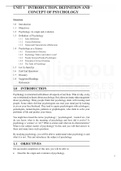5Introduction, Definition and
Concept of Psychology UNIT 1 INTRODUCTION, DEFINITION AND
CONCEPT OF PSYCHOLOGY
Structure
1.0 Introduction
1.1 Objectives
1.2 Psychology: its origin and evolution
1.3 Definition of Psychology
1.3.1 Early Definitions
1.3.2 Current Definitions
1.3.3 Nature and Characteristics of Behaviour
1.4 Psychology as a Science
1.4.1 Characteristics of Science
1.4.2 Psychology: What is and what it is not?
1.4.3 Pseudo Sciences/Pseudo-Psychologies
1.4.4 Principles of Critical Thinking
1.4.5 The Tasks of Psychology
1.5 Let Us Sum Up
1.6 Unit End Questions
1.7 Glossary
1.8 Suggested Readings
References
1.0 INTRODUCTION
Psychology is concerned with almost all aspects of our lives. That is why, every
one is interested to know about psychology. But, there are many misconceptions
about psychology. Many people think that psychology deals with treating mad
people. Some others feel that psychologists can read your mind just by looking
at you or your face/forehead. They tend to equate psychologists with astrologers,
gemologists, numerologists, palmists or graphologists, who claim to solve your
problems of life and predict your future.
You might have heard the terms ‘psychology’, ‘psychological’, ‘mental’ etc., but
do you know what is the meaning of psychology and how did it evolve? Is
psychology a ‘science’ or ‘art’? What is science and what are its characteristics?
What is the subject matter of psychology? In this unit you will find answer to
these and many more such questions.
By studying psychology, you will be able to understand what psychology is and
what it is not. This unit introduces the subject of psychology.
1.1 OBJECTIVES
On successful completion of this unit, you will be able to:
Describe the origin and evolution of psychology. 6Introduction to Psychology,
Objectives, GoalsDefine psychology.
Explain Psychology as a Science.
Elucidate the characteristics of Science.
Describe the nature and characteristics of behaviour.
Explain ‘Pseudo-Psychology’.
Identify the tasks of Psychology.
1.2 PSYCHOLOGY : ITS ORIGIN AND EV OLUTION
The origin of psychology dates back to 1870s. The term ‘Psychology’ is derived
from two Greek words; Psyche means “soul or breath” and Logos means
“knowledge or study” (study or investigation of something). The word
‘Psychology’ was not in common use before the nineteenth century, and the field
of psychology did not actually become an independent science until the middle
of the nineteenth century.
Psychology emerged as an independent academic discipline in 1879, when a
German Professor Wilhelm Wundt established the first psychology laboratory at
the university of Leipzig, Germany. According to Bolles (1993), Wundt was a
medical doctor by training and early in his career, he was fortunate to work with
some of the great physiologists of the nineteenth century. Fittingly, his laboratory
was established during the time he spent as a professor of philosophy. (Remember,
the intellectual roots of psychology lie at the union of philosophy and physiology).
Wundt is traditionally recognised as the founder, or father of the modern
psychology, and 1879 is seen as the year that psychology finally emerged as a
unique field. Prior to Wundt, it was not possible to major in psychology, because
there were no official psychologists or psychology departments. Wundt started
studying the structure of mind which meant the immediate (conscious) experience,
the contents and processes of subjective experience such as sensations, thoughts,
feelings and emotions.
Thus, formally, psychology was recognised as an independent science in 1879.
Let us now look at how psychology has been defined.
1.3 DEFINITION OF PSYCHOLOGY
Psychology has been defined in a number of ways by various authors.
Psychologists had been debating on whether psychology should focus on “mind”,
“consciousness” or “behaviour”. Let us look at how the definitions of psychology
have come a long way over the past 130 years.
1.3.1 Early Definitions
According to Bagga & Singh (1990), the term Psychology was first used by
Rudolf Goeckle, in 1950. They have chronologically given the definitions of
psychology.
Earlier, psychology was part of Philosophy. Ancient philosophers were interested
in the study of the soul. Thus, it was first defined in terms of ‘the science of
soul’. However, since the term ‘soul’ has very wide and comprehensive meanings,




